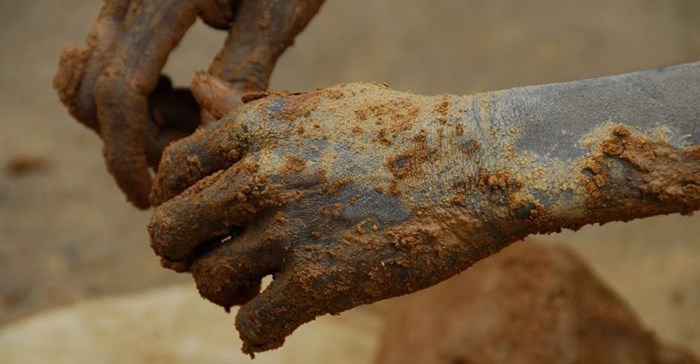Hunt for survivors after Ghana goldmine collapse
The abandoned mine in Prestea-Nsuta, which was more than 80 metres deep, caved in on Sunday afternoon as the miners were coming back to the surface.
"As of now, we are on the site with the rescue teams," Nsuta district police commander Superintendent Atsu Dzinaku told AFP.
"They saw a body which they are trying to get out," he added.
"They assure us they will do their best to get them out from the pit, we are waiting to see what will happen."
The accident has been blamed on small-scale gold mining, known in Ghana as "galamsey", an industry that has recently seen a government crackdown.
One of the miners who managed to escape said he heard "unusual sounds" from the ground as they were working, which prompted him to call for them to stop and surface.
"Some were reluctant because they presumed it was nothing. Others understood and went out of the pit," Ibrahim Musa told AFP, adding the collapse began as they were climbing out.
"The guys who were taking the equipment out, unfortunately, have been trapped on the way because where they were passing had collapsed.
"They were 17 in number and are still trapped there... We have not been able to pull them out."
"Galamsey" has been banned in Ghana since earlier this year after a national campaign called for an end to the practice because of its effect on waterways and forests.
Musa, however, claimed the mine was not off-limits.
Abraham Otabil, a spokesman for the Ministry of Lands and Natural Resources, said the site was not meant to be in operation and the miners had "no right" to be there.
The "galamsey" ban will last until September at the earliest and the ministry is looking at better regulation of the industry across Ghana to make it "more professional", he said.
A "substantial" number of people have stopped mining under the directive but "others are still doing it and these are the results we are getting", he added.
"These reckless deaths should stop."
Ghana is Africa's second-largest gold producer and exports of the commodity, along with minerals and oil, helped boost the country's economic growth until a recent slide.
The industry involves a number of major global players but small-scale, illegal mining has been a persistent problem and accidents are frequent.
In 2010, at least 45 people were killed when an illegal mine collapsed after heavy rains.
Environmental expert Desmond Amankwah said a lack of safety measures and regulation were features of the illicit activity, which can blight farmland for up to 30 years.
But at the same time he said mining provided jobs and development in Ghana, which could explain a push-back against the government crackdown.
"Wherever there is a mining settlement it is more developed than other villages that don't have these minerals," he said.
Source: I-Net Bridge

For more than two decades, I-Net Bridge has been one of South Africa’s preferred electronic providers of innovative solutions, data of the highest calibre, reliable platforms and excellent supporting systems. Our products include workstations, web applications and data feeds packaged with in-depth news and powerful analytical tools empowering clients to make meaningful decisions.
We pride ourselves on our wide variety of in-house skills, encompassing multiple platforms and applications. These skills enable us to not only function as a first class facility, but also design, implement and support all our client needs at a level that confirms I-Net Bridge a leader in its field.
Go to: http://www.inet.co.za








